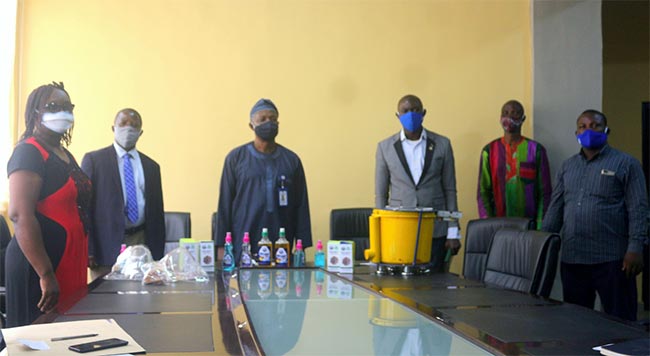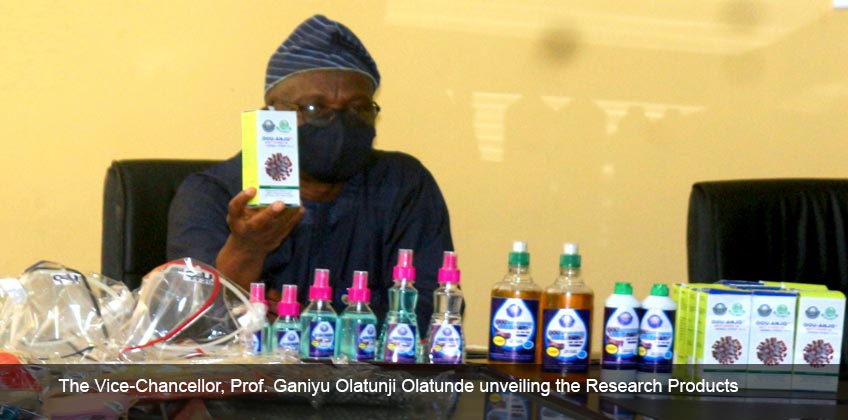The most important roles assigned to Universities are production of highly skilled manpower, research output to solve perceived problems and rendering community services to their immediate environment and beyond. Olabisi Onabanjo University, Ago-Iwoye could boast of operating efficiently with this tripod mandate. This comes on the heels of the unveiling of rare research products by the University on Tuesday, 2nd June, 2020 at the Vice-Chancellor’s Office, in Ago-Iwoye. The products, an anti-COVID-19 syrup, hand sanitizer, automated solar-powered hand sanitizer dispenser, 3-D face shield and face masks.

According to the Vice-Chancellor, the anti-COVID-19 syrup, known as OOU – ANJO ANTI COVID-19 HERBAL SYRUP is a herbal product from a joint initiative of the Phytomedicine Research Unit of the University and Anjola Herbal Company.
Professor Olatunde disclosed further that the anti COVID-19 Herbal Syrup has been submitted to the National Agency for Food and Drugs Administration and Control for approval.
He said “our University is one of the core Universities that engaged in research into the COVID-19 pandemic and in partnership with Anjo, one of our core effective partners in herbal medicine, we’ve been able to produce an anti-COVID-19 herbal syrup which we’ve submitted to NAFDAC for approval”.
“So I can assure you that it went through all the necessary protocols for producing a herbal syrup.” Giving further information on the Herbal Syrup, the Acting Director, Research, Linkages and Advancement, Dr. Joseph Ashidi explained that the syrup contains strong anti-inflammatory substances, antipyretic, antithrombotic plant chemicals, antimicrobial and antiviral agents. He also stated that the herbal product was able to relieve people of symptoms from COVID-19 adding that “the majority of the constituents are part of our regular so called special diets with no indication of toxicity.”
The Deputy Vice-Chancellor, Academic, Professor Deji Agboola, a medical doctor and a Consultant Oncologist who was part of the research team, said that “the syrup does not just boost immunity against the viral disease, it has been proven to have the capacity to effectively manage the symptoms of COVID-19 because the herbal syrup was formulated based on results of post-mortem research conducted on those who died of COVID-19 infection as the team had no access to samples of COVID-19 patients for laboratory test with the syrup.”
Speaking about the other research products, especially the Automated Hand Sanitizer Dispenser, Professor Ganiyu Olatunji Olatunde, in his presentation, said that the machine has a hidden sensor which will activate the mechanism to dispense the sanitizer as the user approaches and puts his hand under the dispenser. He disclosed that it was produced by a team of researchers from the Faculty of Engineering, Ibogun Campus, led by Dr. Sulaimon Musediq. Professor Olatunde revealed that the University has initiated discussion with some private organizations on the possibility of its mass production for wider use.
On the 3-D Face Shield and Nose Masks known as “OOU FT-20”, the Vice- Chancellor noted that these products were not only special but very unique among other personal protective equipment seen all over the country.
According to him “it offers better protection from COVID-19 infection when compared to other face and nose masks.
“It was a collaborative efforts between two of our research groups, the Future of Medicine, Science Technology and Innovation Group and the Triple Helix Research Group”.
The Vice-Chancellor further explained that Olabisi Onabanjo was not a stranger to production of hand-sanitizers. He went the memory lane to remind the Press that the University ventured into the production of hand sanitizers in 2012 during the outbreak of Ebola virus in Nigeria. He, however, stated that “the University is now producing hand sanitizers in commercial quantities.

